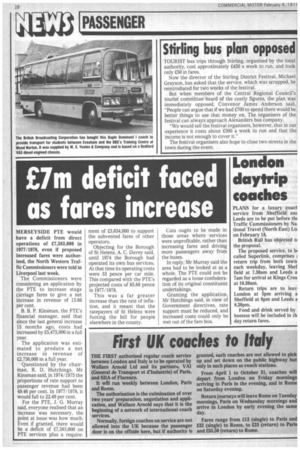Elm deficit faced as fares increase
Page 30

If you've noticed an error in this article please click here to report it so we can fix it.
MERSEYSIDE PTE would have a deficit from direct operations of £7,383,000 in 1977/1978, even if proposed increased fares were authorised, the North Western Traffic Commissioners were told in Liverpool last week.
The Commissioners were considering an application by the PTE to increase stage carriage fares to give a net increase in revenue of 13.86 per cent.
B. B. P. Kinsman, the PTE's financial manager, said that since the last general increase 15 months ago, costs had increased by £5,475,000 in a full year.
The application was estimated to produce a net increase in revenue of £2,756,000 in a full year.
Questioned by the chairman, R. D. Hutchings, Mr Kinsman said, in 1974/1975 the proportions of rate support to passenger revenue had been 49.46 per cent. In 1977/1978, it would fall to 22.49 per cent.
For the PTE, J. G. Murray said, everyone realised that an increase was necessary, the point at issue was how much. Even if granted, there would be a deficit of £7,383,000 on PTE services plus a require ment of £3,634,000 to support the subvented fares of other operators.
Objecting for the Borough of St Helens, A. C. Davey said, until 1974 the Borough had operated its own bus services. At that time its operating costs were 33 pence per car mile. This compared with the PTE's projected costs of 85.88 pence in 1977/1978.
This was a far greater increase than the rate of inflation, and it meant that the ratepayers of St Helens were footing the bill for people elsewhere in the county. Cuts ought to be made in those areas where services were unprofitable, rather than increasing fares and driving more passengers away from the buses.
In reply, Mr Murray said the area had to be looked at as a whole. The PTE could not be regarded as a loose confederation of its original constituent undertakings.
Granting the application, Mr Hutchings said, in view of Government directives, rate support must be reduced, and increased costs could only be met out of the fare box.
































































































































